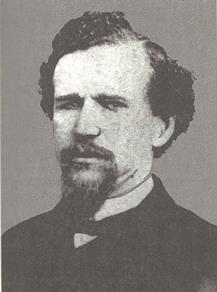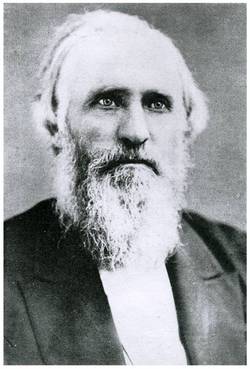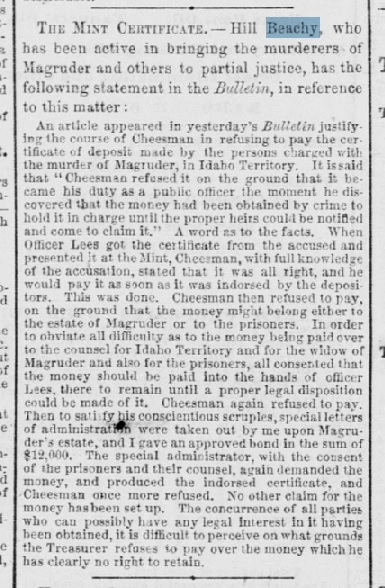launched August 3, 2013
to
project
home page
to Hill Beachey Day Proposed
to research question number 1
to research question number 2
to research question number 3
to research question number 4
to research question number 5
to research question number 6
to research question number 7
to research question number 8
to Hill Beachey Day Proposed
to research question number 1
to research question number 2
to research question number 3
to research question number 4
to research question number 5
to research question number 6
to research question number 7
to research question number 8
Research Question Number 3: What role
did money and the promise of a reward play in the San Francisco police
force's capture of the four suspects?
The first mention I saw of money or the prospect of reward playing a role in the assistance Beachey received from San Francisco's police department occurred in Sheriff James H. Fisk's account of the story, published in The Sunday Oregonian on Feb 11,
1900. Fisk wrote: "A telegram [from Beachey] offering a
reward of $2000 for their capture was sent to detectives Lees and
Johnson, of the San Francisco police force."
Oregonian on Feb 11,
1900. Fisk wrote: "A telegram [from Beachey] offering a
reward of $2000 for their capture was sent to detectives Lees and
Johnson, of the San Francisco police force."
If Fisk's assertion is historically accurate (there are errors in other parts of his account), then how did Beachey intend to pay the reward -- from Magruder's recaptured gold dust perhaps or from his own pocket? Two thousand dollars was, of course, no small sum in 1863.
Detective Isaiah W. Lees
The possibility and propect of a reward crops up a couple of times in William B. Secrest's (2004) book on San Francisco's crack police detective, Isaiah W. Lees.
One concerns a possible bribe. "Page claimed Lees and their attorney," wrote Secrest, "were promised all the money but a thousand dollars if they could get free" (p. 115). This offer, however, appears to have come to naught.
But Secrest does not exclude the prospect of reward from Lees' motivations in the story of Magruder's murderers' capture. "It can be assumed," wrote Secrest, "that Lees hoped for a share of the stolen money, since he often applied for rewards during his career" (p. 118).
Secrest's account also noted that a conflict emerged over the custody of Magruder's purloined gold dust after a substantial portion of it had been discovered deposited at the San Francisco mint. One of Lees' initial leads on the identities of the suspects grew out of his department's investigation of the question of whether a large deposit of dust had recently been made at the mint. It seemed likely to the detective, wrote Secrest, that they would make such a deposit after their arrival.
A mint official named D.W. Cheesman reported that such a deposit had been made on October 29, 1863 by men identifying themselves as "James M. Romaine, Dan. Howard & G. Clark" (quoted in Secrest, p. 114). They were issued a certificate for the deposit.
As the story unfolded, however, Cheesman became unwilling to transfer custody of the gold either to Beachey or to Detective Lees.
When Beachey finally won custory of the four suspects and took possession of the deposit document, he "turned the certificate over to one Maurice Dore to continue trying to collect the money for Magruder's wife. Reuben Lloyd was to aid in any legal work" (Secrest, p. 116).
According to Secrest, Beachy headed north with his prisoners on the steamer Pacific on the morning of Nov 18, 1863.
The following day the Sacramento Daily Union reprinted an item from the [San Francisco] Bulletin in which Beachey described and lamented Cheesman's continuing reluctance to release Magruder's gold.

Secrest's account concluded the saga as follows: "It took much legal squabbling and a threatened lawsuit before some seven thousand dollars were finally surrendered to Mrs. Magruder" (p. 116).
Apparently, however, concerns persisted in some quarters regarding Lees' relationship to the promise of reward and Magruder's gold dust. An investigation was launched. Secrest noted: "The police commissioner's investigation of Lees' conduct in the case was reported in the Idaho Boise News of April 30, 1864 and the Marysville Daily Appeal, April 2, 1864" (p. 118).
Lees was apparently cleared of any impropriety. Nevertheless, it would be useful of course to collect the two newspaper articles Secrest cited -- and perhaps even the police commissioner's report itself.
The first mention I saw of money or the prospect of reward playing a role in the assistance Beachey received from San Francisco's police department occurred in Sheriff James H. Fisk's account of the story, published in The Sunday
 Oregonian on Feb 11,
1900. Fisk wrote: "A telegram [from Beachey] offering a
reward of $2000 for their capture was sent to detectives Lees and
Johnson, of the San Francisco police force."
Oregonian on Feb 11,
1900. Fisk wrote: "A telegram [from Beachey] offering a
reward of $2000 for their capture was sent to detectives Lees and
Johnson, of the San Francisco police force."If Fisk's assertion is historically accurate (there are errors in other parts of his account), then how did Beachey intend to pay the reward -- from Magruder's recaptured gold dust perhaps or from his own pocket? Two thousand dollars was, of course, no small sum in 1863.
Detective Isaiah W. Lees
The possibility and propect of a reward crops up a couple of times in William B. Secrest's (2004) book on San Francisco's crack police detective, Isaiah W. Lees.
One concerns a possible bribe. "Page claimed Lees and their attorney," wrote Secrest, "were promised all the money but a thousand dollars if they could get free" (p. 115). This offer, however, appears to have come to naught.
But Secrest does not exclude the prospect of reward from Lees' motivations in the story of Magruder's murderers' capture. "It can be assumed," wrote Secrest, "that Lees hoped for a share of the stolen money, since he often applied for rewards during his career" (p. 118).
Secrest's account also noted that a conflict emerged over the custody of Magruder's purloined gold dust after a substantial portion of it had been discovered deposited at the San Francisco mint. One of Lees' initial leads on the identities of the suspects grew out of his department's investigation of the question of whether a large deposit of dust had recently been made at the mint. It seemed likely to the detective, wrote Secrest, that they would make such a deposit after their arrival.

A mint official named D.W. Cheesman reported that such a deposit had been made on October 29, 1863 by men identifying themselves as "James M. Romaine, Dan. Howard & G. Clark" (quoted in Secrest, p. 114). They were issued a certificate for the deposit.
As the story unfolded, however, Cheesman became unwilling to transfer custody of the gold either to Beachey or to Detective Lees.
When Beachey finally won custory of the four suspects and took possession of the deposit document, he "turned the certificate over to one Maurice Dore to continue trying to collect the money for Magruder's wife. Reuben Lloyd was to aid in any legal work" (Secrest, p. 116).
According to Secrest, Beachy headed north with his prisoners on the steamer Pacific on the morning of Nov 18, 1863.
The following day the Sacramento Daily Union reprinted an item from the [San Francisco] Bulletin in which Beachey described and lamented Cheesman's continuing reluctance to release Magruder's gold.
News item, Sacramento Daily Union,
November 19, 1863
November 19, 1863

Secrest's account concluded the saga as follows: "It took much legal squabbling and a threatened lawsuit before some seven thousand dollars were finally surrendered to Mrs. Magruder" (p. 116).
Apparently, however, concerns persisted in some quarters regarding Lees' relationship to the promise of reward and Magruder's gold dust. An investigation was launched. Secrest noted: "The police commissioner's investigation of Lees' conduct in the case was reported in the Idaho Boise News of April 30, 1864 and the Marysville Daily Appeal, April 2, 1864" (p. 118).
Lees was apparently cleared of any impropriety. Nevertheless, it would be useful of course to collect the two newspaper articles Secrest cited -- and perhaps even the police commissioner's report itself.
Send news to ronroizen@frontier.com, along with any pdfs or other copies of the materials.
New materials, whenever they are appropriate, will be published on this page as they arrive.
I'm looking forward to hearing from you!